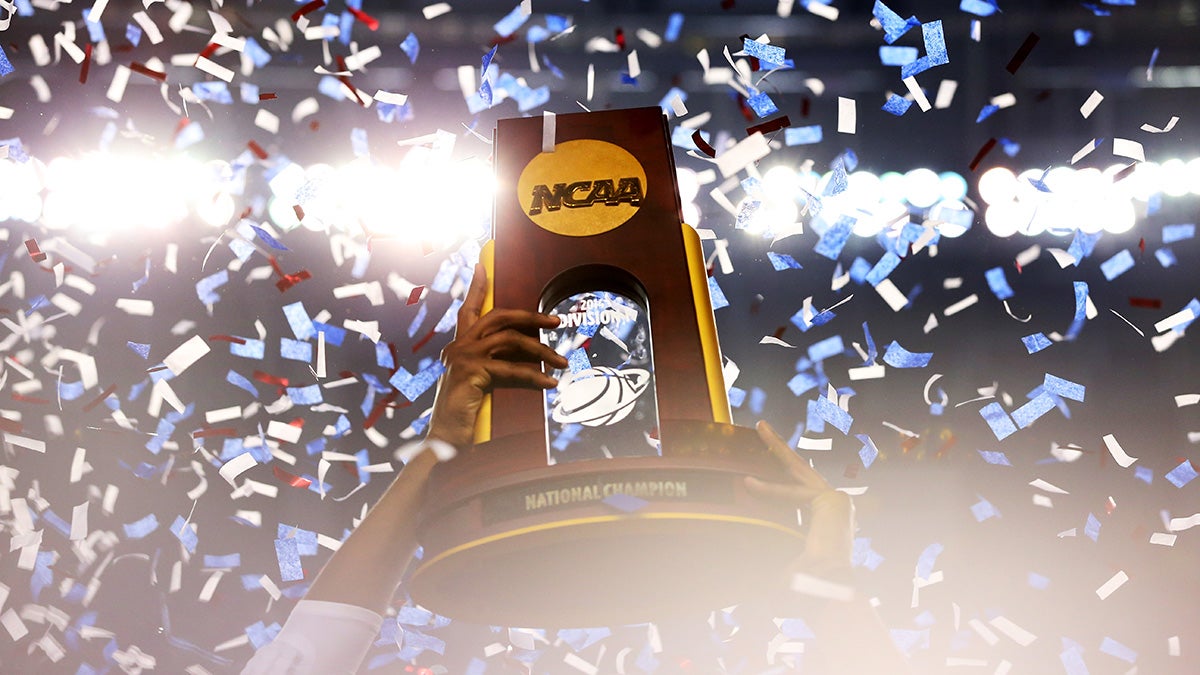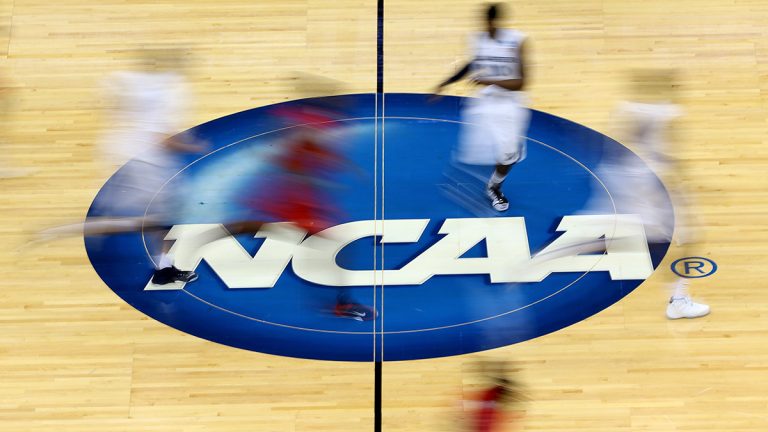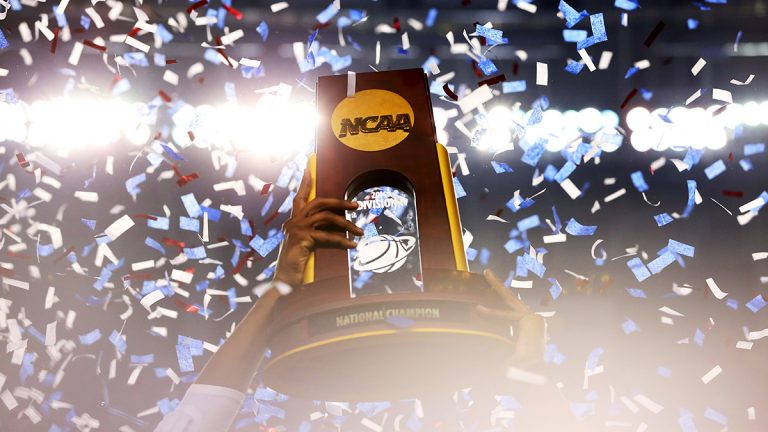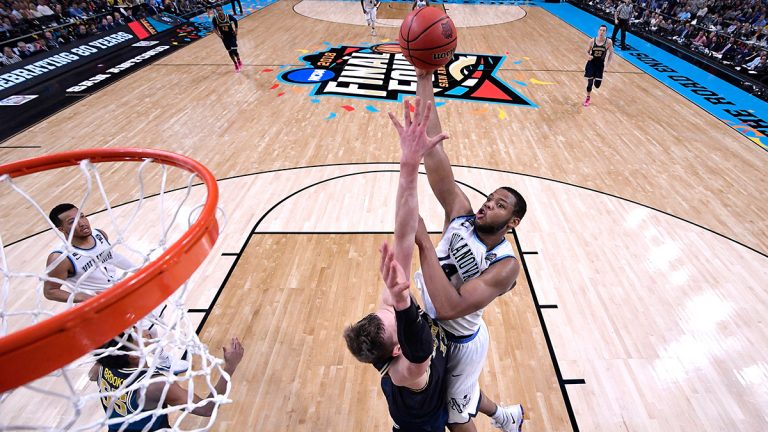Signed California law sets up showdown with NCAA over student-athlete compensation
Why this matters
A new California law is potentially the first step for NCAA student-athletes to control the use of their name, image and likeness. If other states follow suit, the NCAA may be forced to act.
With one signature, California Gov. Gavin Newsom may have changed the landscape of NCAA-sanctioned athletics forever.
Newsom signed SB 206, also known as the “Fair Pay to Play Act,” on the set of HBO’s The Shop on Sept. 27. The law allows NCAA student-athletes to make money off of their name, image and likeness (NIL), but does not allow the school to pay the athletes themselves.
“Every single student in the university can market their name, image and likeness; they can go and get a YouTube channel, and they can monetize that,” Newsom said in an interview with The New York Times. “The only group that can’t are athletes. Why is that?”
California Senators Nancy Skinner, D-Berkeley, and Steve Bradford, D-Gardena, were the sponsors of the bill, which passed through the assembly (73-0) and the state Senate (39-0) earlier in September. The law does not take effect until Jan. 1, 2023.
“The NCAA agrees changes are needed to continue to support student-athletes, but improvement needs to happen on a national level through the NCAA’s rules-making process,” the NCAA said in a statement Sept. 30. “Unfortunately, this new law already is creating confusion for current and future student-athletes, coaches, administrators and campuses, and not just in California.”
For Arizona State University law professor of practice Don Gibson, this could be an opportunity for the NCAA. “If the NCAA wanted to take the lead on this and make a very complicated issue go away, I think this is one way in which they could do so,” he said.
Much of the concern from those around the NCAA, including coaches like Arizona State University’s Herm Edwards, has been about the unfair advantage the law will give the four Pac-12 California schools — Stanford, Cal, USC and UCLA.
LeBron breaks down what would’ve happened if he’d gone to college and says his family wouldn’t have gotten anything from it.
(via @BenGolliver) pic.twitter.com/tmbmU3K5jn
— Bleacher Report (@BleacherReport) September 30, 2019
“It’ll give the California schools an advantage in recruiting, to be quite honest,” Edwards said. “I think you’re opening Pandora's box when you do that because if you decide to do that and you’re a student-athlete, you’re in California, one of those California schools, you’re going to have an advantage just promoting that because the scholarships are still about the same.”
In a statement the Pac-12 expressed unhappiness with the bill, saying “The Pac-12 is disappointed in the passage of SB 206 and believes it will have very significant negative consequences for our student-athletes and broader universities in California. This legislation will lead to the professionalization of college sports and many unintended consequences related to this professionalism, imposes a state law that conflicts with national rules, will blur the lines for how California universities recruit student-athletes and compete nationally, and will likely reduce resources and opportunities for student-athletes in Olympic sports and have a negative, disparate impact on female student-athletes.”
After the bill was passed earlier in September, the NCAA sent a letter signed by President Mark Emmert and 21 other members of the organizations board of governors to Newsom. The letter warned the governor of the ramifications across the college landscape, saying that the bill is “unconstitutional” and “harmful.”
“You’re challenging a system that has been entrenched with money and power and a certain way of thinking for a long time, which I think can resonate with a lot of people in this room, so the minute you challenge that you’re going to get a lot of blowback,” former Connecticut and current Phoenix Mercury star Diana Taurasi said on the same episode of The Shop.
Solution: scrap your rule that prohibits college athletes from making $ from their names, images & likenesses. Then, it will national reform. NCAA’s own resistance for change is what will create the “problem” it seems to want to avoid. https://t.co/J9sxONoKjo
— Darren Heitner (@DarrenHeitner) September 30, 2019
Taurasi noted that her jersey was still hanging in the student union of Connecticut, where she played college basketball.
“I graduated in 2004,” she said. “We’re talking about 10 (plus) years later. They’re still making money off of us.”
The NCAA also warned Newsom that enacting this law may cause the organization to disallow California colleges from participating in intercollegiate athletics because of the unfair advantage they would have over schools in other states.
“I expect that they will threaten and they may file lawsuits especially because the bill as drafted threatens the NCAA structure, particularly if other states follow suit and create the potential for multiple states that are looking to advance this issue of athlete compensation through some means involving the validity of the student athlete to exploit is image, name or likeness,” Gibson said.
If no other states follow suit with similar legislation and the NCAA does ban California schools, Gibson said it will almost certainly lead to litigation.
The NCAA “agrees changes are needed,” but wants to do it on its own time, if at all. Well, you’ve had over 100 years to figure it out. Time is up. https://t.co/0NA1CphWax
— Jay Bilas (@JayBilas) September 30, 2019
“All schools that are members of the NCAA subscribe to an agreement as to how they would operate and they agree to adhere to NCAA rules and regulations,” Gibson said. “Every school agrees to that. If you have a law that compels a school to do certain things that contravene or are in conflict with the NCAA guidelines that creates a real conflict. That puts the school at real issue with not just the state law but the NCAA regulations and that’s going to lead to litigation.”
However, the bill states that it bars colleges from penalizing athletes who benefit from their name, image and likeness and it also “prohibits the NCAA from banning California colleges from intercollegiate sports if student-athletes elect to exercise their NIL rights.”
“They (the NCAA) are a little panicked because they recognize that they are vulnerable,” Newsom said on The Shop. “People are hitting this, not just in California but all across the country because the gig’s up. Billions and billions of dollars, 14 plus billion dollars goes to these universities, a billion plus revenue goes to the NCAA themselves and the actual product, the folks putting their lives on the line are getting nothing.”
This legislation also gives student-athletes the ability to hire agents to help them with endorsement deals and contracts.
“People are just so aware of the fact that you’ve got a multibillion-dollar industry that, let’s set aside scholarships, basically denies compensation to the very talent, the very work that produces that revenue,” said Skinner, who wrote the legislation. “Students who love their sport and are committed to continuing their sport in college are handicapped in so many ways, and it’s all due to NCAA rules.”
UCLA football coach Chip Kelly on #SB206:
“I think the NCAA will have to make their adjustments. I think the law goes into effect in 2023. There should be a lot of discussion that goes on between then.”
— James H. Williams (@JHWreporter) September 30, 2019
The argument for and against paying student-athletes has picked up steam lately with more state legislatures taking up bills on the topic.
“There is a fine line between being paid because, do you pay the seniors more than the freshman? Do you pay the women’s lacrosse team as much as the football team?” ASU's Edwards said. “I say this, if you want to pay them, give them an amount, say this is the amount and when you graduate, you get this, but only after you graduate.”
The 2009 O’Bannon v. NCAA lawsuit, which was decided in 2014, got the ball rolling on all of these recent issues, bringing to light that student-athletes weren’t being paid for the use of their names and likenesses in video games. In 2015, the NCAA awarded Power Five schools (universities in the Big Ten, Big 12, ACC, Pac-12 and SEC) the ability to give their athletes stipends.
Many of the arguments for paying athletes are based on the fact that student athletes are unable to have a “normal” college life despite having a 20-hour-per-week limitation on time devoted to the sport and mandated days off.
In a world with many misconceptions, here's another: O'Bannon took away NCAA video games. No. His case brought to light illegal--yes, illegal--use of players' identities. NCAA could announce today that players can sign with EA. Very simple. Need not be complicated or litigious. https://t.co/RlLKl4Lu3s
— Michael McCann (@McCannSportsLaw) September 30, 2019
Victoria Jackson, a former distance runner at ASU and the University of North Carolina and now a Clinical Assistant Professor of History at ASU, said that being a runner was good because of the limit it placed on her time.
“I never thought of it at the time, but now that I study this stuff, I was really lucky that I was a distance runner, because there’s a limit to how much you can run every week. If you run more than that, then you’re going to get injured. So, I never spent more than 20 hours a week on sports,” Jackson told Global Sport Matters.
Conversely, former NFL and UCLA punter Chris Kluwe said he struggled to find time for things other than football in his college days.
“If we’re demanding eight, 10 hours a day from our athletes to do stuff, it doesn’t leave a whole lot of time for school work. So you really don’t get that academic experience,” Kluwe told GlobalSport Matters.
“And you would see the other sports like gymnastics, softball, and women’s volleyball; those are all sports that the school expected those athletes to perform at a championship level, but they weren’t getting nearly the amount of facilities, and money, and attention as the football team and the men’s basketball team,” Kluwe said. “So absolutely I can see that students are feeling that they are being taken advantage of.”
Matt Roy is a masters sports journalism student at Arizona State University
Evan Desai contributed to this report.





